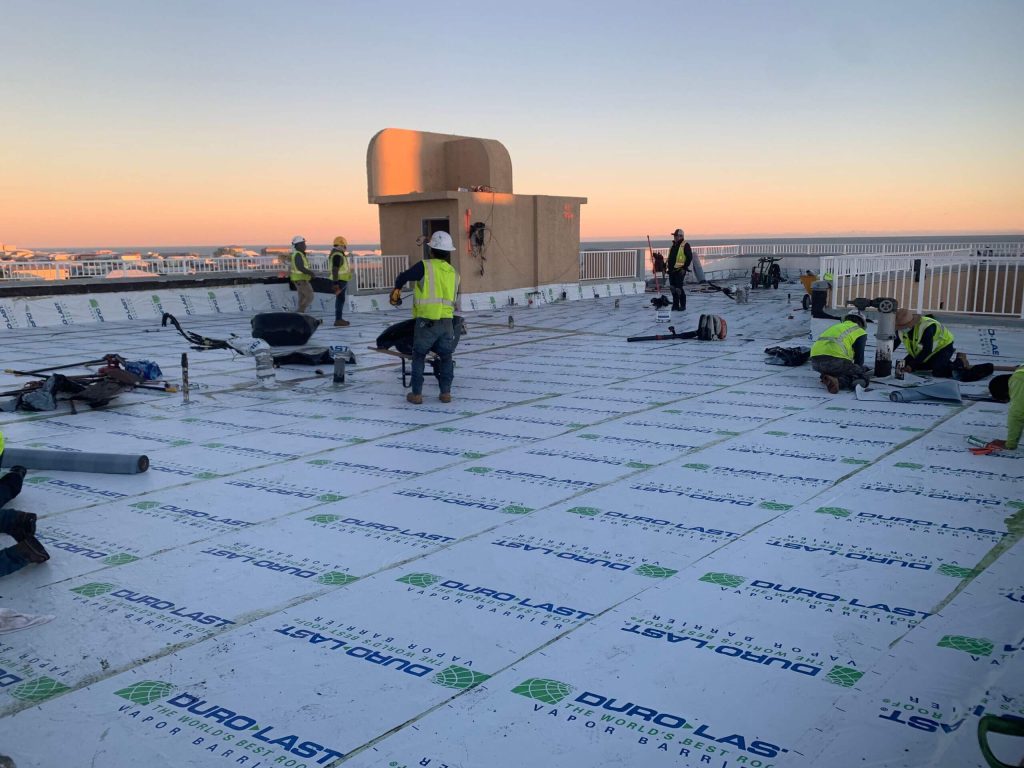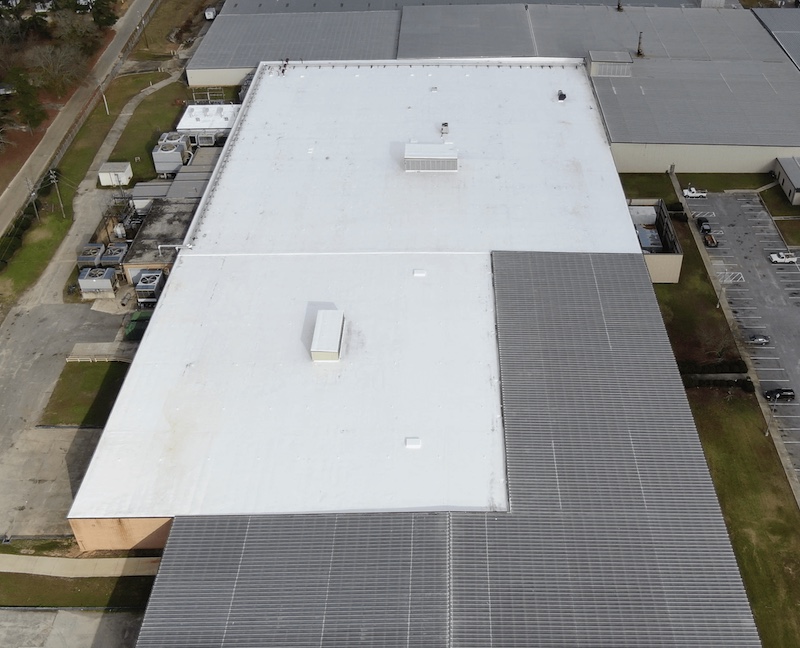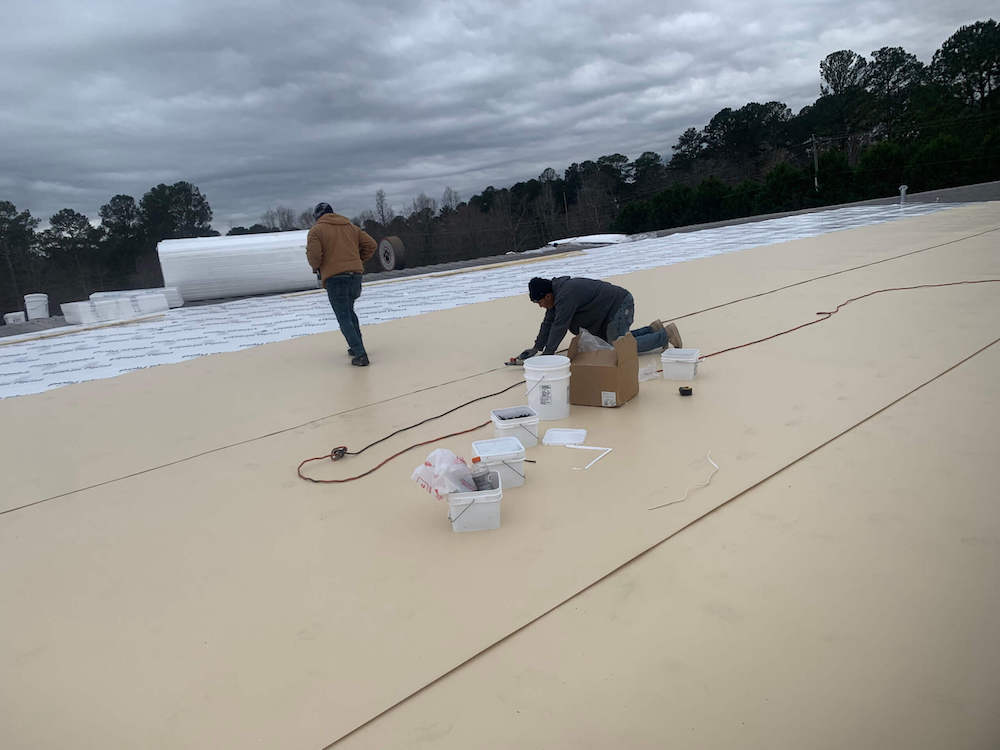PVC roofing or polyvinyl chloride is a single-ply roofing solution used on commercial or industrial roofs that are flat or low sloped. PVC or polyvinyl chloride, is the third-most widely produced synthetic plastic polymer
What is TPO Roofing?
TPO or Thermoplastic Polyolefin is a single-ply roofing membrane that is one of the fastest growing commercial roofing systems on the market. TPO roofing systems are made up of a single layer of synthetics and reinforcing scrim that can be used to cover flat roofs.
PVC comes in a variety of colors ranging anywhere from tans, and grays, to the most commonly used white color.
PVC is very effective at resisting UV radiation. Its white color also aids in reflecting the sun’s rays. This helps to save you money because it lowers your cooling costs in warm climates. It also helps to reduce the heat island effect which can occur in urban areas.
PVC does not only meet the requirements for a Class A fire rating, it also contains special chemicals that allow it to be a self-extinguishing material. In various tests, PVC has proven to be more fire-resistant than TPO. The video below shows an experiment done to see how TPO and PVC burn.


Another advantage of PVC is that it comes in different thicknesses. This gives consumers more options. The thicknesses of the PVC can range anywhere from 40 mils to 80 mils.
PVC is very resistant to tears and punctures. It has a Class 4 Hail damage rating which means it withstood the simulated 2-inch sized hail test. This test is usually performed with a 2-inch sized spherical piece of ice or sometimes a metal ball.
PVC does a good job of being resistant to chemicals like oil and grease, which makes it ideal for fast food restaurants who use a lot of oil and grease to cook their food. Sometimes the grease trap exhaust fan leaks grease onto the roof.
PVC is similar in price to other low slope roof options.
PVC has a life expectancy of about 20 – 30 years which is a pretty normal life expectancy for a roof. That is about the same life expectancy as some common types of asphalt shingles.
Duro-Last Vapor Barrier
Duro-Last Pvc roof system
Metal retrofit in Tan Duro-tuff
The seams of PVC are welded together using a special heat welder. The sealed seams if properly welded do an excellent job at keeping water out. Heat-welded seams are more effective than other seams that are bonded together using an adhesive tape.

It is fairly simple to make repairs to a PVC roof. All you will need is a heat welder and a roller to make most repairs.
PVC holds up well in strong winds. It has a strong wind uplift rating and has been known for withstanding category 3 hurricanes which are wind speeds between 110 mph to about 130 mph.
PVC just like other roofing materials like EPDM and TPO is recyclable. Recycling agencies can turn your old roof into a new roof material, athletic fields, picture frames, shipping materials, and more.
PVC exceeded the ASTM standard of break strength which is about 200 lbs per square inch. PVC was rated for over 300 lbs per square inch. Which shows it was truly developed with durability in mind.
PVC is a lightweight roofing option. It is a single-ply roof system meaning you don’t need multiple layers of the PVC membrane. PVC weighs at most 51 lbs per square (Depending on thickness). Which is less than asphalt shingles which weigh about 150 to 240 lbs per square.
PVC can be used on both residential and commercial roofing systems. It can be used on flat roofs as well as but low sloped roofs.
PVC is known to be a bit more flexible than TPO. Some roofing contractors may prefer to use PVC over TPO due to the flexibility characteristics.
PVC can be installed during cold temperatures and winter seasons as long as the temperature is above -58° F . After the PVC is attached it is sealed with a heat welder. As long as the heat welder is able to bring the temperature of the PVC membrane to about 1094°F then it will seal properly. The weather just may make the welding process longer.